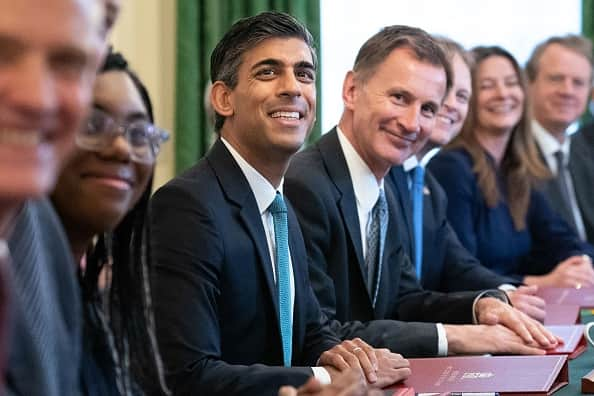Independent pay review recommends 6% pay rise for public sector: PM considering deal despite inflation fears
This article contains affiliate links. We may earn a small commission on items purchased through this article, but that does not affect our editorial judgement.
and live on Freeview channel 276
Despite a split within his Cabinet, Rishi Sunak and Jeremy Hunt are considering giving substantial pay rises to certain groups of striking public sector workers. The Times reported five cabinet ministers are backing the deal to avoid more strikes although it is feared the move could set off a “wage-price spiral” and fuel inflation.
Home Secretary Suella Braverman, Health Secretary Steve Barclay, Education Secretary Gillian Keegan, Defence Secretary Ben Wallace and Justice Secretary Alex Chalk are all backing the proposals, the report said.
Advertisement
Advertisement
The five ministers are reportedly urging Sunak to respect the recommendations of independent pay review bodies in an attempt to stop industrial action and help workers with the cost of living.
Both Sunak and Hunt, the chancellor, will respond to the recommendations in two weeks’ time, with the prime minister saying he is prepared to overrule the independent pay review bodies amid the inflation woes.
The prime minister has made it clear any pay rises must not be funded from additional borrowing or tax rises, meaning departmental budgets could face significant cuts given the estimated cost of the pay increases amounts to £5 billion.
The independent bodies have privately recommended teachers should receive a 6.5 per cent pay rise for 2023-24; police officers, prison officers and junior doctors should all get 6 per cent or more, while armed forces personnel should receive between 5 and 6 per cent.
Advertisement
Advertisement
The head of the NEU, a teachers’ union whose members have gone on strike twice this week over a pay dispute that has been ongoing since February, stated a 6.5% rise would end the strikes.
However, Dr Mary Bousted cautioned that the money would have to come from the government and not through an extra squeeze on schools.


Junior doctors have demanded a 35% pay increase, which is significantly higher than the 6% that could be offered. Doctors union, the BMA, has said this is a negotiating starting point, but it is unclear whether members would accept a 6% rise if it were offered.
Junior doctors in Scotland called off their planned strike on Friday (July 7) after the Scottish government proposed a 12.4 per cent pay increase for 2023-24.
Advertisement
Advertisement
Ms Braverman, Mr Wallace, and Mr Chalk are urging Mr Sunak and Mr Hunt to accept the recommendations of the pay review bodies because a large number of their department’s employees cannot legally go on strike.
